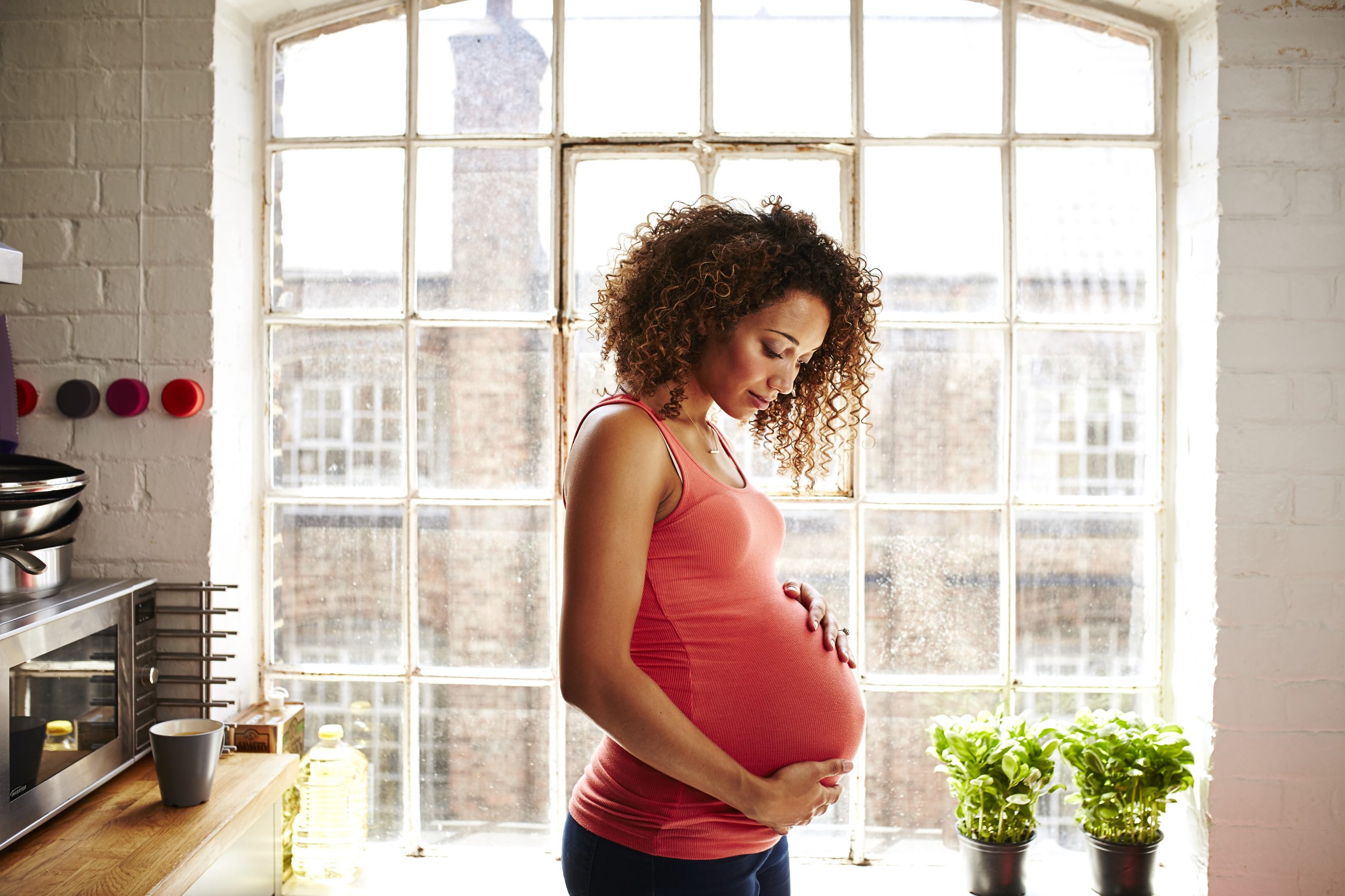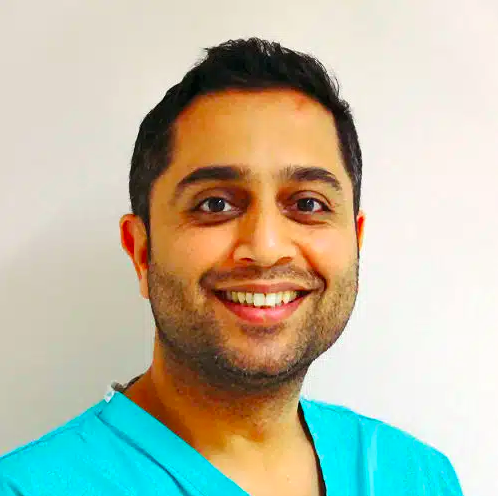Internationally renowned experts in endometriosis and consultant gynaecologists answer questions on endometriosis and pregnancy
Doctors answer common questions about endometriosis and pregnancy, fertility, and options for getting pregnant with endometriosis.

Endometriosis and pregnancy is a complicated topic, as although the condition has been linked to issues with fertility and getting pregnant, the fertility problems caused by endometriosis are not fully understood and indeed, some women will be able to get pregnant naturally despite having the condition.
Endometriosis is a common gynaecological disease and according to leading charity Endometriosis UK, 1.5 million women and those assigned female at birth in the UK are currently living with endometriosis.
Mr Hemant Vakharia, a Consultant Gynaecologist and Advanced Laparoscopic Surgeon at London Gynaecology, and one of the doctors who shared their advice with us on endometriosis and pregnancy, told GoodToKnow, "Endometriosis is a condition where tissue similar to the lining inside the uterus (endometrium) grows outside the uterus, leading to various symptoms, including painful periods, pain with intercourse, heavy periods and, in some people, difficulty conceiving."
In addition to Dr Vakharia, we also consulted Dr Shaheen Khazali, consultant gynaecologist at The Lister Hospital, and Dr Denis Tsepov, consultant gynaecologist, laparoscopic surgeon and clinical lead at from The Harley Street Endometriosis Centre. Experts in their fields, the three doctors shared their general advice with us about endometriosis and pregnancy, fertility, and options for getting pregnant with endometriosis, as well as answering common questions about the condition below.
The information in this article is for general purposes only and does not take the place of medical advice. It is important to discuss your pregnancy with your midwife and if you are unsure or concerned about endometriosis and how it might affect your fertility or pregnancy, then it is crucial to seek personalised advice from a doctor.
How does endometriosis affect fertility?
Due to a lack of research, the links between fertility and endometriosis are not fully known. Not all women with endometriosis experience fertility problems and some will be able to get pregnant without any medical intervention.
The NHS states that, "one of the main complications of endometriosis is difficulty getting pregnant or not being able to get pregnant at all," however Dr Hemant Vakharia emphasises that just because you have endometriosis, it doesn’t mean you won’t be able to get pregnant. The impact that endometriosis will have on fertility varies from person to person and depends on the severity of the condition. Dr Vakharia says, "Crucially not all individuals with endometriosis will experience difficulty conceiving as the impact of endometriosis on fertility can vary greatly from person to person" and charity Endometriosis UK explains, "With increasing severity of endometriosis, scar tissue (adhesions) becomes more common and the chance of conception decreases. This is because, with severe disease, there is more scar tissue (adhesions) that can trap the egg and prevent it from getting down the Fallopian tube."
Parenting advice, hot topics, best buys and family finance tips delivered straight to your inbox.
Dr Vakharia went on to say, that when it comes to fertility, endometriosis can affect it in several ways:
- Inflammation and Scarring: The endometriotic tissue outside the uterus can cause inflammation (the body's response to injury or infection) and scarring (fibrous tissue that replaces normal tissue after an injury). This can affect the ovaries, fallopian tubes, and the lining of the pelvic cavity, potentially hindering the movement of the egg and sperm and also causing adhesions (structures sticking together)
- Impaired Egg Quality: Endometriosis when affecting the ovaries directly can lead to the formation of cysts known as endometriomata. These cysts can negatively impact ovarian tissue, potentially affecting the quality and quantity of eggs.
- Blocked Fallopian Tubes: The scarring caused by endometriosis as described above can lead to the fallopian tubes becoming blocked, preventing the egg and sperm from meeting, which is essential for fertilisation. Up to 30% of women with endometriosis have tubal pathology (obstruction, adhesions or hydrosalpinx - (swollen fallopian tube).
- Altered Pelvic Environment: Endometriosis can lead to changes in the hormonal environment necessary for ovulation (the release of an egg from the ovary), fertilization, and implantation of the embryo in the uterus.
"I would strongly recommend that women who have endometriosis discuss their desire to get pregnant with their specialist earlier rather than later," says Dr Denis Tsepov. "A lot can be done before pregnancy to try and improve the outcome."
What are the options for getting pregnant with endometriosis?
Despite the risk of endometriosis to the reproductive system in more advanced stages, research from endometriosis experts Professor Andrew Horne and Carol Pearson suggests that up to 70 per cent of women with the condition are still able to get pregnant "naturally and without a problem” and Endometriosis UK confirms this data stating that, "60 - 70% of those with endometriosis will get pregnant ‘spontaneously’, by which doctors mean, without medical intervention."
The NHS confirms that getting pregnant with endometriosis is possible and, "not all women with endometriosis will have problems and some will eventually be able to get pregnant without treatment."
Dr Vakharia explains, "The chances and challenges of achieving pregnancy with endometriosis largely stem from how the condition affects the reproductive organs in an individual. As mentioned above, inflammation and scar tissue can distort the anatomy of the pelvis, making it harder for the sperm to reach the egg or for the fertilised egg to implant in the uterus. The quality of the eggs can also be compromised, and the environment within the uterus may become less conducive to implantation, further complicating the process of getting pregnant. These are all unique and variable to an individual and therefore the chances of conceiving depend on individual circumstances."
Despite these challenges, there are several options for those looking to conceive with endometriosis who are struggling to conceive naturally:
- Surgery: Surgery to remove endometriosis tissue can alleviate pain and may improve fertility, particularly for those with mild to moderate endometriosis. This is typically done laparoscopically, a minimally invasive procedure that removes endometrial implants and scar tissue. The evidence for the benefit for surgery in severe disease is less clear and depends on individual circumstances. The NHS states: "Surgery to remove endometriosis tissue can help improve your chances of getting pregnant, although there's no guarantee that you'll be able to get pregnant after treatment. Surgery for endometriosis can also sometimes cause further problems, such as infections, bleeding or damage to affected organs. If surgery is recommended for you, talk to your surgeon about the possible risks."
- Assisted Reproductive Technologies (ART): Techniques such as in vitro fertilisation (IVF) can be helpful for those with endometriosis especially in those with blocked fallopian tubes. IVF involves fertilising an egg outside the body and then implanting the embryo into the uterus, bypassing many of the challenges endometriosis may pose to natural conception. However, the NHS states, “women with moderate to severe endometriosis tend to have a lower chance of getting pregnant with IVF than usual.”
- Lifestyle Changes: Whilst not a direct treatment for difficulty conceiving, adopting certain lifestyle changes can support overall reproductive health. This includes maintaining a healthy weight, reducing stress, and stopping smoking.
"If you suffer with endometriosis and you have been trying to conceive for 12 months and you have been unsuccessful, you should speak to your doctor to discuss your options," Dr Khazali suggests.
If you are looking to get pregnant, or if fertility is a priority or concern, always talk to your GP or endometriosis specialist for personalised advice and the best treatment and fertility options for your situation. Fertility options discussed with an endometriosis or fertility specialist before pregnancy will allow couples to understand how they can optimise their chances of conceiving.
How does endometriosis affect pregnancy?
Endometriosis can affect pregnancy in a number of ways, but this will vary from person to person and will also depend on how severe the condition is.
Dr Shaheen Khazali says, "Pregnancy affects women in different ways; most women find that their endometriosis symptoms lessen when they fall pregnant, due to raised levels of progesterone and because they are no longer having periods." However, pregnancy may only reduce the painful symptoms of endometriosis in the short term. Research published in the Human Reproduction Update in 2018 suggests that there's "fewer beneficial effects than previously reported" and little evidence that getting pregnant reduces or gets rid of endometriosis symptoms in the long term.
Dr Hemant Vakharia explains, "Those with mild [endometriosis] are considered less at risk and in general can expect a normal pregnancy and labour. Those with severe disease are considered high-risk and require additional antenatal and intrapartum care."
"It is important to discuss your pregnancy with your midwife and be booked under consultant-led care, especially in those with severe disease," Dr Vakharia adds.
Endometriosis may increase particular risks during pregnancy and may cause complications during the child's birth. Dr Denis Tsepov told us, "Endometriosis can affect the muscle of the uterus – myometrium and this is associated with higher risk of early miscarriage. This condition is called Adenomyosis. It can also complicate pregnancy during later stages."
The chances of having a miscarriage can increase if you have endometriosis, with Endometriosis UK explaining, "Sadly, miscarriage is a common problem in all pregnancies, regardless of whether or not you have endometriosis. Miscarriage occurs in around 1 in 5 pregnancies, and if you have endometriosis, the risk increases to around 1 in 4."
Mr Shaheen Khazali says other risks include "preterm birth, the need for caesarean section and low-lying placenta" with Dr Vakharia explaining that studies have shown that endometriosis in pregnancy is also associated with an increased risk of pre-eclampsia, postpartum haemorrhage (bleeding after birth), fetal growth restriction and adverse neonatal outcomes.
Endometriosis UK advise, "if vaginal bleeding and abdominal pain are experienced in the first trimester (first 12 weeks of pregnancy) it is advised that you seek medical attention to check there are no complications with the pregnancy."
"Additionally, women with endometriosis who become pregnant can benefit from an early ultrasound scan and early antenatal care with increased level of foetal wellbeing monitoring during all three trimesters of their pregnancy," Mr Tsepov says.
"These patients are best looked after in ‘high risk antenatal clinics’ by experienced obstetric consultants and midwives. The decision where to deliver the baby – either on a midwifery led unit or on high-risk delivery suite – should be discussed individually with an obstetric consultant with risks balanced versus benefits."
Can endometriosis cause ectopic pregnancy? Is there anything that can be done to help avoid this?
Endometriosis UK states, "Ectopic pregnancies are less common than miscarriages, with around 1 in 80 to 100 pregnancies ending up as ectopic. But, research has shown that in those with endometriosis, the risk is more than doubled."
An ectopic pregnancy is when a fertilised egg implants itself outside of the womb, often in the fallopian tubes. These tubes connect the ovaries to the womb. So when an egg gets stuck in them, it can't develop into a baby.
Dr Vakharia explains, "In patients with tubal disease (blocked fallopian tubes/swollen tubes) there is an increased risk of a tubal ectopic pregnancy. In some cases, to improve fertility outcomes, patients may be advised to have the affected tube clipped or removed to reduce this risk. If not, then there is nothing specific that can be done to avoid this, but patients are advised to have an early scan in pregnancy."
If you are unsure or concerned about endometriosis and how it might affect your fertility or pregnancy, then it is crucial to seek personalised advice from a doctor.
Getting support for endometriosis
All our experts say the best place to seek help with fertility or pregnancy if you have endometriosis is an endometriosis specialist.
Visit your GP who will be able to refer you to a specialist as part of the NHS. Alternatively, you can visit a private specialist.
As well as medical support, you might find that help through a support group is useful. Endometriosis UK offers general information and advice for those with the condition, along with a directory of local support groups. If you’d like to find out more about Endometriosis UK or their support services you can visit endometriosis-uk.org or call their helpline on: 0808 808 2227.
Dr Vakharia answers frequently asked questions about endometriosis and pregnancy
The following answers were all provided by Mr Hemant Vakharia, a Consultant Gynaecologist and Advanced Laparoscopic Surgeon.
Does everyone with endometriosis require infertility treatment?
The short answer is 'No'. Not everyone with endometriosis will require fertility treatment and some patients may not realise they have endometriosis until it is picked up on imaging or during a surgical procedure.
Can you get pregnant naturally with endometriosis?
Absolutely! I have seen patients with severe endometriosis conceive naturally but again this depends on their individual circumstances.
Is pregnancy with endometriosis high risk?
Those with severe disease are considered high-risk and require additional antenatal and intrapartum care.
Those with mild disease are considered less at risk and in general can expect a normal pregnancy and labour.
Can you give birth naturally with endometriosis?
Yes, in general there is no reason why you cannot deliver vaginally but there may be individual circumstances for specific patients where a specialist may recommend a vaginal birth.
Can you develop endometriosis after pregnancy?
Yes, endometriosis can develop after pregnancy.
The information on GoodTo.com does not constitute medical or other health advice or diagnosis and should not be used as such. Although GoodtoKnow consults a range of medical experts to create and fact-check content, this information is for general purposes only and does not take the place of medical advice. Always seek the guidance of a qualified health professional or seek urgent medical attention if needed.
Our experts

Mr Khazali is an internationally renowned expert in advanced robotic and laparoscopic endometriosis surgery and in minimally invasive gynaecology. His practice is almost exclusively dedicated to looking after women with the most severe forms of endometriosis when the disease has affected other organs such as the bowel, bladder, ureters and pelvic nerves.
He started his specialty training at John Radcliff Hospital, Oxford, having spent his basic training in London and Cambridge. He then moved to the south coast where he did the majority of his training and worked in Poole, Winchester and Southampton hospitals. Mr Khazali holds a Masters degree in Advanced Gynaecological Endoscopy from the University of Surrey, where he is now a faculty member and an honorary senior lecturer.

Mr Tsepov is an internationally recognised expert gynaecological surgeon performing robotic surgery on DaVinci Xi surgical robot for severe endometriosis, uterine fibroids and complex benign gynaecological pathology. At The London Endometriosis & Advance Pelvic Surgery, which Mr Tsepov has established, he works in close partnership with multidisciplinary robotic surgery experts. The Centre has been accredited as an endometriosis referral centre by The British Society Of Gynaecological Endoscopy (BSGE) in 2022 based on the results of a surgical and patient outcomes audit.

Mr Hemant Vakharia MBBS, BSc (HONS) MRCOG is a Consultant Obstetrician and Gynaecologist with specialist training in advanced laparoscopic surgery. He works at London Gynaecology and Barnet hospital which is part of the Royal Free NHS Trust where he was the clinical director for women’s services for five years.
Mr Vakharia qualified from the Royal Free & University College Medical school and trained in the North Central & East Thames rotation. During his training he also completed additional training at Birmingham Women’s Hospital where he completed his advanced training in minimal access surgery.
This article was originally published on 25th August 2021 and was updated on April 15th 2024 to ensure that all information is up to date and reflects current expert advice on the topic.

An internationally published digital journalist and editor, Rachael has worked for both news and lifestyle websites in the UK and abroad. Rachael's published work covers a broad spectrum of topics and she has written about everything from the future of sustainable travel, to the impact of the coronavirus pandemic on the world we live in, to the psychology of colour.

